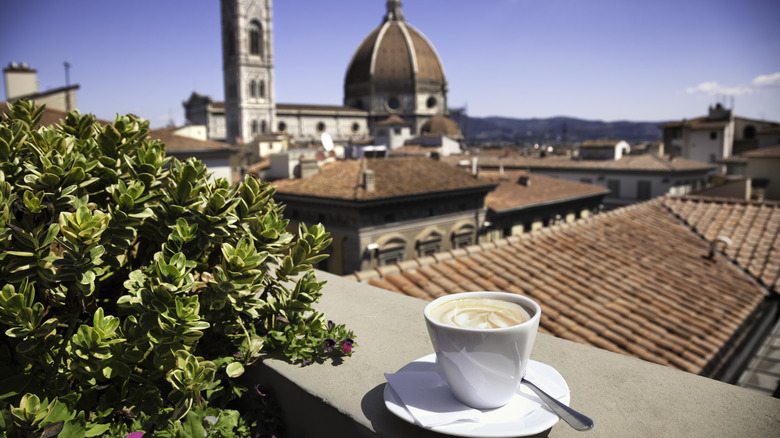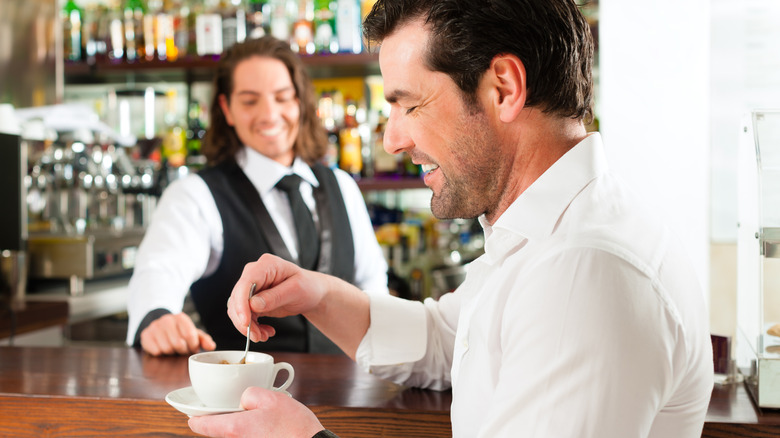How Drinking Coffee Like A True Italian Local Could Save You Some Money
A trip to Italy can be an unforgettable experience, with a chance to enjoy the beautiful architecture of Rome or the splendor of St. Mark's Square in Venice. However, it can be a challenge to explore Italy on a budget while designing an itinerary filled with activities that will create an authentic experience in this vibrant country. The good news is that one of the best ways to immerse yourself in Italian culture may be the most inexpensive, and it's hidden in plain sight. Standing at a bar to enjoy an espresso only costs around €1, while a seat at a table costs an additional surcharge. As it turns out, there are several reasons why this simple moment may be the most genuine Italian experience you enjoy during your time in the country.
Espresso is beloved to Italy, and there are rituals and customs surrounding it that are steeped in history and meaning. If you order a coffee in an Italian bar, this naturally means that you're asking for an espresso, instead of the drip variety that has been sitting on the counter all day. In fact, the espresso was created in 1903 by Luigi Bezzera, who invented a way to use steam to deliver a serving of strong coffee quickly, or "expressly," into his cup. The origin of the drink and its association with the country's heritage is part of the reason Italians place so much importance on the art and tradition of their coffee ritual.
A daily routine
Italy has a distinctive coffee culture that sets it apart from other countries. For example, a Viennese cafe in Austria is the setting for long conversations without concern for the passage of time, while in Italy, the custom of going out for coffee follows a different tradition. Most patrons order espresso from their local bar while standing at the counter. These establishments offer alcohol as well as some food items, but the main reason Italians visit a bar is to enjoy an espresso. A pleasant exchange often takes place between the customers and the barista, then each patron carries on with the day after a few minutes. Most Italians have a favorite local bar, and stopping inside for a moment on a daily basis is a way to pause and connect with others who frequent the bar just as regularly.
Part of the charm of this custom is its simplicity. It only takes a few minutes to drink a shot of espresso while standing at the bar. Savoring a frothy cappuccino, for example, is not traditionally ordered after 10 a.m., as the idea of drinking a glass of warm milk in the middle of the day would interfere with one's digestion. The simple price of €1 is also significant. Espresso is considered a necessity, and the Italian government has regulated its price since 1915. Maintaining this cost is the reason why it's possible for Italians to honor this tradition regularly, whether it's morning, afternoon, or evening.
A social tradition
The familiarity of this routine and conviviality with the other patrons can be contrasted with other (American) ways of ordering a coffee, such as waiting in a line of cars in a drive-through while an order is prepared. While this method is convenient, it can lack a sense of connection and warmth. Walking inside and spending a few moments at the bar will break up the day, create a personal interaction, and make this coffee break feel intentional.
There are times when it makes sense to take a seat at a table, of course. Caffè Florian in Venice, which opened in 1720, is considered the oldest espresso bar in Italy, and it is a hallowed spot. Its architecture is magnificent, and visitors pay an additional fee for the privilege of sitting at a table to listen to the orchestra play as they enjoy a refreshment. This enchanting experience is well worth the additional price.
During the rest of your trip, however, save money by enjoying your shot of espresso at the local bar. Exchange pleasantries with the barista and the other regulars who make this visit a daily priority. Standing at the bar to enjoy a quick espresso is not simply an economical way to boost your caffeine level for the day, it's actually the most authentic Italian experience you'll have on your trip. And who knows — if you visit often enough, it's possible that you'll start to be treated as a local as well.


